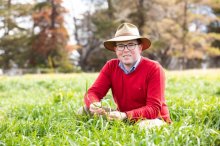-
Featured Items
-
Featured Resources
 Funding & Grants
Don't miss out on funding opportunities. Stay informed with our up to date online listings and email notifications.
Read More
Funding & Grants
Don't miss out on funding opportunities. Stay informed with our up to date online listings and email notifications.
Read More
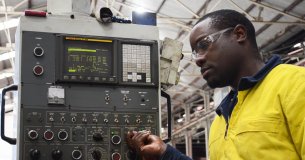 Skilled Migration
Our services help both applicants and employers, to learn more, develop plans, submit applications, and settle in.
Read More
Skilled Migration
Our services help both applicants and employers, to learn more, develop plans, submit applications, and settle in.
Read More
 Research and Analysis
Good research and analysis makes the case. How can our resources and services help your project or application?
Read More
Research and Analysis
Good research and analysis makes the case. How can our resources and services help your project or application?
Read More
 Information & Data Resources
With resources like REMPLAN, Regional Knowledge Base, and decades of data, discover how we can help your project.
Read More
Information & Data Resources
With resources like REMPLAN, Regional Knowledge Base, and decades of data, discover how we can help your project.
Read More
-
Stay InformedSubscribe to one or more of our regular email subscriptions, to be kept up to date on news and funding opportunities for the region
-
-
Our Region
- Our Region
- Regional Plan
- Regional Data
- Current Regional Issues
- Population Migration Analysis for 2016-21
- Job Vacancies Continue at All-Time High
- National Debt - What it Means for Our Economy?
- The True Value of Home Solar
- The Economic Impacts of Local Government Amalgamations
- State of the Regions Report 2014-15
- Antifragility - A different take on regional economic development
- Biohubs - Collaborative Waste Management
- Attracting New Residents
- Socio-Economic Impacts of the Murray Darling Basin Plan
- Murray Darling Basin Water Recovery
- Growing Businesses
- The Northern Inland Economy
- Geographical Overview
- Major Industry Sections
- Our Services
- Grants and Funding
-
Skilled Migration
- Skilled Migration
- Skilled Employer Sponsored Regional Visa
- Skilled Work Regional Visa (subclass 491)
- Temporary Seasonal Workers
- Designated Area Migration Agreement (DAMA)
- Helpful Information for Visa Holders
- Information for Employers
- Case Studies
- Payment Details
- Advice & Further Information
- Contact Details
- News & Events
-
Our Projects
- Our Projects
- Current Projects
- Skilled Migration
- Wool Works - Wool Training Schools
- Metal Works - Welding and Fabrication Schools
- Come On Inland
- Stories of Resilience
- Alt Brothers Beekeeping - Glen Innes
- Carelle's Toy Store - Glen Innes
- Greenhill Orchards - Arding
- Gwydir Meats - Warialda
- Kaputar Motors - Narrabri
- Moonbi General Store - Moonbi
- Sandstock - Tingha
- Sherelle Fashions - Tenterfield
- Sleepy Merino - Inverell
- Tenterfield Chamber of Toursim, Industry and Business - Tenterfeild
- The Welders Dog - Armidale
- Walcha Veterinary Supplies - Walcha
- AGCAP - Agribusiness Careers & Professions
- Northern Inland Regional Investment Profile
- Past Projects
- Digital Economy Strategy
- Business Growth Project
- Go Digital
- How to Start an Online Business
- Create Your Website Using Squarespace
- How to Edit Your Squarespace Site - Part 1
- How to Edit Your Squarespace Site Part 2
- Add a Shop to Your Squarespace Site
- Start a Blog and Find out What Customers are Searching
- 14 Tips For a Better Blog Post
- Which Social Media Platforms are Best for Your Business
- How to Use Facebook Effectively For Your Business – Part 1
- How to Use Facebook Effectively For Your Business – Part 2
- Instagram Tips for Business
- Catching Up, More Instagram & Dealing with Haters
- Getting Started with Twitter for Business
- Social Media Scheduling Tools
- How to Start an Etsy Shop – Part 1 – Research
- How to Start an Etsy Shop – Part 2 – Signup
- Online Security for Your Business
- Product Photography and Website Images: Your Guide
- 5 Tips to Improve your Productivity in your Business
- Best Online Business Resources
- How to Improve Your Communication Skills and Win More Clients
- NBN Coordinator
- Putting Power Back in the Regions
- Road Freight Study
- Town Audit Benchmarks
- Food and Wine
- Youth Survey
- Digital TV Switchover Assistance
- Northern Inland Transport Guide
- Live.Train.Work
- Northern Inland Innovation Awards
- Northern Inland Innovation Awards - 2017
- Northern Inland Innovation Awards - 2016
- Northern Inland Innovation Awards - 2015
- Northern Inland Innovation Awards - 2014
- Northern Inland Innovation Awards - 2013
- Northern Inland Innovation Awards - 2012
- Norther Inland Innovation Awards - 2011
- Prime Super Northern Inland Innovation Awards - 2010
- Prime Super Northern Inland Innovation Awards - 2009
- Northern Inland Innovation Awards - 2007
- Northern Lights Project
- NBN Smart Home
- Murray Darling Basin
- Moree Plains Business Workshops
- Namoi Investment Prospectus
- Industrial Land
- Bioenergy and Local Electricity Retailing
- Northern Inland Business Energy Assessment
- Skills for the Future
- Impacts of COVID-19 on Businesses
- Past Projects of NIRDB
- Aboriginal Employment and Enterprise in the Gunnedah Region
- Art as an Industry
- Aviation Survey
- Farm Forestry - Northern Inland Forestry Investment Group
- New England North West Film Strategy
- Northern Inland Excellence in Business Awards
- Food and Wine 2003 - 2008
- Prime Super Northern Inland Innovation Awards 2009
- Regional Business Networking Program
- Regional Leadership Course 2008
- Viticulture Strategy 2002-2003
- About Us
- Contact Us
- Other Resources
- Privacy and Legal
- Search
Back to Newsletters
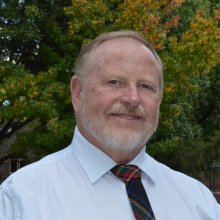
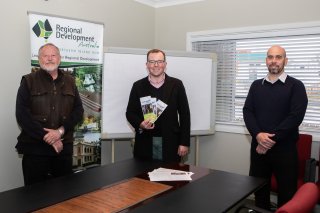
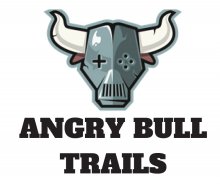
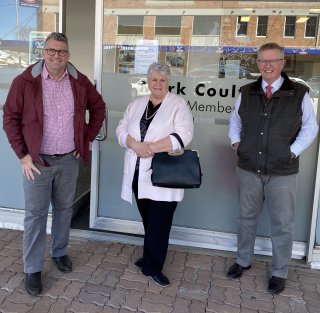
August 2020 Newsletter
Monday 31st of August 2020
In This Issue:
- Welcome from the Chair
- Mustering Up the Next Generation of Wool Shed Workers
- Calling All Mountain Bike Riders!
- Funding to Support Economic Development in Moree and Wee Waa
- Clarification on Travel for 489 Visa Holders
- Connecting Industry and Research Expertise
- Help Harvest NSW – Linking People with Available Farm Work
- Funding is Available for Public Spaces
- Featured Grants and Funding Opportunities
Welcome from the Chair

Dear Northern Inlanders,
Tough times continue to test us, but as they say, when the going gets tough, the tough get going! While it is hard to picture what the world will be like post-pandemic, it is important that we start working towards our region’s future now and make plans as best we can.
I often say that our youth is our future, and I am pleased to say that we have received funding from the NSW Government under the Stronger Country Communities Fund for our Glen Innes shearing school program. This funding will secure another four three-day shearing schools that will benefit secondary school children from around our region, by providing them with hands-on skills, as well as promoting the available careers in the wool industry.
I was also pleased to hear the announcement of funding for the Moree and Wee Waa communities under the Murray-Darlin Economic Development Program. Particularly the $450,000 being provided for the Yarrie Lake Water Security Project, which will underpin recreational tourism in the area as well as create much needed jobs. Our team did an amazing job to help get this project over the line for much needed funding. Don’t forget the expertise of our staff are available to help develop grant applications and business cases for the wealth of great ideas that our communities have for our region.
Regards,
Russell Stewart
Chair
Mustering Up the Next Generation of Wool Shed Workers

At a time when COVID-19 travel restrictions have caused a shearer shortage in parts of rural NSW, we are working to ‘muster’ the next generation of shed workers, through a $60,000 State Government grant under the Stronger Country Communities Fund to conduct a number of wool handling schools at Glen Innes.
The funding was announced by Northern Tablelands MP and Minister for Agriculture Adam Marshall earlier this month and he said if ever there was a time to bleat about the need to train new shearers, it was now.
“Through its Wool Works Shearing School at the Glen Innes Agriculture Research Station, RDA Northern Inland is showing local high-school students the exciting and rewarding career opportunities which exist on the floor of a wool shed,” Mr Marshall said. “A fall in sheep numbers and the physical nature of shed work has led to a decline in people entering the industry in recent years, this has meant wool growers have had to rely on shearing teams from inter-state and New Zealand to get their wool clip off.”
“Through its wool handling schools RDA Northern Inland is getting locals back in the shed and will put this grant towards conducting four, three-day courses for secondary school students over the next twelve months. “The funds will cover the cost of hiring expert trainers, purchasing equipment while subsidising student’s transport, accommodation and catering.”
“I called in to one of these schools last year and it was humbling to see some of our area’s best shearers encouraging and teaching students these age-old skills. Our region was built on the sheep’s back and hopefully over time we will start to see more teenagers inspired to pick up the shears and pursue a career in the sector.”
The grant will give more than 100 young people hands on experience working in a wool shed. “In 2016, we conducted research which found approximately 200 new shearers need to be trained to enter the industry on an annual basis,” said RDA-NI Executive Director, Nathan Axelsson. “At a local level, we could see the shortage of skilled shearers in the New England was beginning to impact our premier super fine and ultra-fine wool growers.”
“Since 2017, we have run four successful shearing schools with more than 100 participants, working with NSW DPI and a number of other farming groups to expose young people to the various components of wool growing, including wool handling, animal health and husbandry. COVID-19 has impacted our classes in 2020, however we hope to be back at the stand for the first of the four shearing schools in September, with follow up courses in November this year and March/April next year.”
Further information about our shearing schools is available on the Shearing School page our website. Any schools that would like to be involved can contact our office to express their interest by email on rdani@rdani.org.au.
Calling All Mountain Bike Riders!

Like many communities in our region, Tenterfield has been devastated by drought, bushfires and the COVID-19 pandemic. Tenterfield Shire Council are looking to diversity and revitalise their economy by creating an Adventure Tourism hub centred around the CBD and hinging off new world-class mountain bike trails.
The development would represent the largest Mountain Bike trail destination in Australia and the Angry Bull Mountain Bike Trails destination would feature:
- 150kms of single track and trails in a picturesque environment surrounded by National Parks, Forests and Farm Land.
- The longest downhill track in Australia.
- A 400m gravity track close to the town centre.
- A pump track in the Tenterfield CBD
- Links back to the CBD for riders to access accommodation, meals and shopping.
- Become the focus of an Adventure Tourism Hub featuring other activities such as bushwalking, horse riding, rock climbing, fishing, fossicking, farm stays and cultural and heritage attractions.
Tenterfield Shire Council is conducting a feasibility study into creating a mountain bike destination in their shire and are seeking the input from riders. We are seeking input from mountain bike riders on behalf of Tenterfield Shire Council to help gauge the market appeal for such a destination, and we would appreciate your assistance by completing this short 2 minute survey.
Funding to Support Economic Development in Moree and Wee Waa

Moree Plains Shire Council, Wee Waa Community Arts and Cultural Centre and Narrabri and District Chamber of Commerce have been successful in receiving a total of $1.34 million to benefit the Moree and Wee Waa communities through the Murray-Darling Basin Economic Development Program.
Moree Plains Shire Council will receive $515,468 for their Smart Region Business Incubator and Co-working space. The incubator, known as ‘The Greenhouse’ will help new businesses and to upscale existing business to entice investment.
“This co-working space will not only be available to local and visiting workers; it will also include the delivery of the well-established business incubator program from University of New England,” said Member for Parkes, Mark Coulton. “The incubator will be based in the main street to encourage local spending in cafes and retail stores to also contribute to the local economy.”
Wee Waa Community Arts and Cultural Centre will receive $382,197 to convert an existing building into an arts and cultural gallery space supported by a part-time project manager for three years.
$450,000 of funding will be provided for the Yarrie Lake Water Security Project under the program to make this proposal a reality for Wee Waa. We had the pleasure of working with the consortium between Collins Park Lighting Group, Wee Waa Chamber of Commerce, Narrabri Chamber of Commerce and community stakeholders who brought RDANI to the table with a proposal that formed into this project.
Yarrie Lake is an important recreational facility for local Wee Waa residents and visitors to the region and the only significant water-based recreational lake within a 200km radius of Wee Waa. It is situated within the Narrabri Local Government Area and provides activities including water sports, camping, bird watching, yabbying and mountain bike riding. However, the lake often dries out.
This project will provide bore water to the lake, and a solar system with battery storage to the associated camping facilities and bore pump at a total cost of $525,000. It will greatly improve the amenity value of the location and significantly increase visitor expenditure in the Wee Waa economy.
Clarification on Travel for 489 Visa Holders
It has come to our attention that some 489 visa holders and employers believe the need to live and work in a regional location means a 489 visa holder cannot go to the major cities. We have sought official clarification from the Department of Home Affairs about this matter, and we have received the following details that indicate that there is is flexibility and 489 visa holders may visit Sydney, Melbourne or Newcastle, for leisure or work related travel, keeping in mind the current requirements due to the COVID-19 pandemic.
Below is a copy of the advice we received from the department:
Time in Australia spent outside a designated regional area
Under the 489 visa, Condition 8549 (now referred to under the new visa programs as condition 8579) requires that while the visa holder is in Australia, they must live, work and study only in a designated regional area.
Condition 8579 is not intended to prevent a visa holder from engaging in incidental activities outside a Designated Regional Area (DRA). Such activities may include:
• holidays;
• work-related travel;
• work-related training
The Department will adopt a flexible approach to the assessment of compliance with condition 8579, taking account of the personal circumstances affecting individual visa holders.
However, extended absences from the DRA may result in further scrutiny by the Department to ensure that the visa holder is or was living, working and studying in the DRA during the relevant periods.
The Department may request further evidence from the visa holder on the reason for travel outside the DRA, where:
- the holder spends more than 90 days in total per annum outside the DRA, or
- the holder spends more than 60 continuous days outside the DRA, or
- there is a pattern of extended and/or frequent absences that are indicative of employment outside the DRA.
Employer based outside a designated regional area
In determining whether the person is working in a DRA, the Department must establish where the person is physically located in relation to their usual place of work. Where the Department is able to establish that the person's usual place of work is in a DRA, the person has met the requirements of this condition.
In cases where an employer is based in a metropolitan area of Australia, or overseas, but is operating in a DRA through a local office of branch, if the visa holder is working in the local office located in a DRA, then they meet the work requirements of condition 8579.
Connecting Industry and Research Expertise
Industry can easily connect with relevant researchers through three freely available directories developed by IC Global, which is powered by the CSIRO.
ExpertConnect is a free, publicly searchable database of Australia’s research expertise, with more than 70,000 expert profiles from over 220 research organisations. The database is constantly updated automatically using a variety of sources, including, patent data, grant data, journal articles and profiles. Users can search for a topic of interest using everyday language, and the platform takes into account academic expertise and industry knowledge to provide a list of the most relevant experts that are most likely to also understand the business context.
Expert FindHer has been developed with the aim to boost gender equality in Australia’s innovation and startup ecosystems. It provides information about funding sources, programs, networks and tools that can help women entrepreneurs.
Innovation Challenges allows users to put forward details of the problem they are looking to solve, and experts can propose solutions. This facilitates complex problems to be solved in innovative ways, and assists users to identify the most promising solution and the expertise required.
Help Harvest NSW – Linking People with Available Farm Work
Farmers will be able to capitalise on what is predicted to be the best harvest in many years, with the launch of the Help Harvest NSW website. The website is a new one-stop resource which will help the agriculture industry overcome a COVID-induced labour shortage and get unemployed Australians into critical work.
With NSW at the forefront of this year’s big winter crop comeback after drought and horticulture about six weeks from harvest, Minister for Agriculture Adam Marshall said it was critical to act now as there would be a shortage of between 3,500 and 5,000 workers needed in the state.
“Farmers are desperate to find contractors and employees willing to work to make the most of the bumper harvest we’re about to have,” Mr Marshall said. “A high volume of primary industries labour generally comes from overseas and due to COVID-19 international travel restrictions there simply isn’t the number of farm workers the ag industry needs at the moment.”
“The Help Harvest NSW website will help to overcome this challenge by connecting job-seeking Australians with agricultural work opportunities in NSW. I want to see more Aussies climb off the couch and get out into the regions where there’s plenty of good paying work on until the end of the year.”
“At a time when we are just beginning to emerge from drought, our State’s farmers cannot afford to miss out on the financial uplift that comes from a strong harvest.” With higher than average unemployment due to COVID-19, Mr Marshall said that ‘Help Harvest NSW’ was a way to get the State’s workforce moving again."
“Never before and never again will Australians have a better chance to take up farm work, earn a decent wage and see first-hand our beautiful regions where the food we buy every day from the supermarket is produced. Take a look at Help Harvest NSW and see what job opportunities are around the corner.”
Funding is Available for Public Spaces
Six local councils in the Northern Inland are in the running to unlock millions of dollars in State Government funds to improve parks and public spaces.
Six local councils in the Northern Inland will have the opportunity to deliver new and improved public spaces for their local communities thanks to the NSW Government’s $250 million NSW Public Spaces Legacy Program as part of the NSW Government’s COVID-19 Recovery Plan. By focusing on fast-tracking development assessments for projects that deliver much-needed jobs and housing, Tenterfield Shire, Uralla Shire, Gunnedah Shire Glen Innes Severn Shire and Moree Plains Shire Councils will be eligible for up to $2 million each in funding for parklands, town squares and main streets, while Armidale Regional Council will be eligible for up to $3 million as a ‘regional city council’.
“As part of the NSW Public Spaces Legacy Program, councils that push forward with assessments of job-creating projects will be incentivised with funding for more, and better, public spaces,” NSW Treasurer Dominic Perrottet said. “This program will unlock construction jobs across the State helping combat the economic shocks of COVID-19 while making communities a better place to live."
Minister for Planning and Public Spaces Rob Stokes said the program would create a lasting community benefit across the state. “Now we’re helping councils to prioritise local planning projects that will boost jobs and investment in their communities with a $250 million incentive to create new and improved public spaces. We want councils to think big and bold and deliver legacy projects – new parks, new walking trails, more walkable and inviting streets and open spaces for their communities.”
“The Public Spaces Legacy Program is like a game show which no one can lose,” said member for Northern Tablelands, Adam Marshall. “All these councils have to do is show the Department of Planning how they will accelerate important local projects, improve assessment timeframes and then deliver, and its pay day for their communities.”
“This is the time for councils to instigate positive change for their communities, by not only cutting red tape but delivering parks and public places which make their towns and villages more liveable for residents. Every job created by speeding up the development process is a win in a rural town during this difficult period, and so really there is no losing with this scheme.”
Councils which adopt a Local Acceleration Program have between 1 September 2020 and 30 June 2021 to improve their activity. Further information about the NSW Public Spaces Legacy Program is available on the NSW Department of Planning, Industry and Environment website.
Featured Grants and Funding Opportunities
To help businesses and individuals affected by Coronavirus (COVID-19) access the available assistance we have created a dedicated Coronavirus Assistance page on our website. This page will be updated as details become available on the recently announced economic stimulus packages from the Australian and NSW Governments.
There is also wide range of assistance available for individuals, businesses and communities that have been affected by the ongoing drought and the recent bushfires. To help you access this support, we have created dedicated Drought Assistance and Bushfire Assistance pages on our website which are being updated reguarly.
Below are some featured grants and funding opportunities from the multitude of open grants listed in the Grants and Funding Opportunities area of our website. Our website is updated weekly with new listings and updates and all are applicable to our region, so it is a great resource if you are looking for funding for a specific project.
You can also sign up to our Business and Infrastructure Funding Opportunities and the Community Grants and Award Programs newsletters through the simple form located on the left-hand side of our website: www.rdani.org.au, to receive monthly summaries of currently open grants.
Business Research and Innovation Initiative Pilot Priority Sectors
Closes: 10th of September 2020
Value: Up to $100,000
Run By: Australian Department of Industry, Science, Energy and Resources
This program provides small to medium sized enterprises (SMEs) with grant funding to develop innovative solutions for government policy and service delivery challenges. The program covers up to five challenges each round for which SMEs can develop solutions.
The objective of the program is to drive innovation within small to medium sized enterprises (SMEs) and government by encouraging the development of innovative solutions by SMEs to public policy and service delivery challenges.
The five challenges for this round are:
- Revolutionising agricultural spray applications
- Turning farm crops into a renewable hydrogen source
- Turning office trash into energy treasure
- Counting fish using advanced technologies
- Automating the detection of whales at sea
Quality Learning Environments Program
Closes: 25th of September 2020
Value: Up to $15,000
Run By: NSW Department of Education
The QLE program allows not-for-profit community preschools (centre based and mobile) and not-for-profit long day cares to apply for grants of up to $15,000 (ex GST). Grants can be used to purchase resources and activities which improve physical or educational learning environments. This may include quality improvement initiatives to meet the needs of services impacted by bushfire and recent severe weather events or other emergency situations such as COVID-19.
Improvements to physical learning environments can include the completion of minor capital works and investment in infrastructure items. Improvements to the educational learning environment can include specialised educational programs and activities.
Applications must demonstrate a link between proposed resources and activities and the service’s identified areas for improvement, outlined in their Self-Assessment documentation or Quality Improvement Plan.
Homelessness, Health, and Housing Grants
Closes: 30th of September 2020
Value: Unspecified
Run By: The James Frizelle Charitable Foundation
The James Frizelle Charitable Foundation has been established to support those who have contributed to our great country but may have unfortunately through no fault of their own, fallen on hard times and can no longer speak for themselves. The foundation wishes to assist them to get their life back on track and restore their dignity by working with other eligible charities who have the necessary expertise and human resources but need financial support.
The foundation has multiple grant streams currently open:
- Community Health Grants
- Disadvantaged Grants
- Domestic Violence Grants
- Homelessness Grants
- Housing and Accommodation Grants
- Mental Health Grants
- Natural Disasters Grants
Related Pages







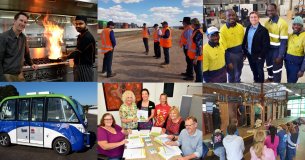 Latest News
Latest News
